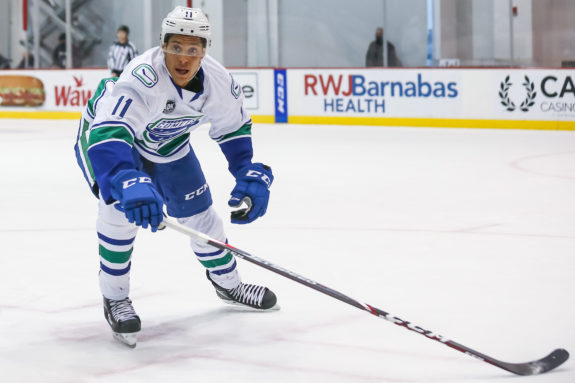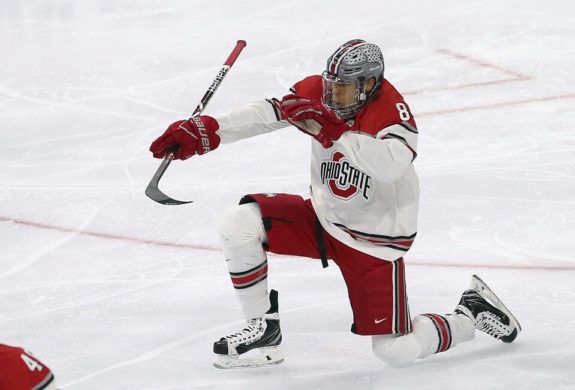In season-ending press conferences, St. Louis Blues’ head coach Craig Berube and general manager Doug Armstrong were both surprisingly upbeat heading into an early offseason.
Just two seasons removed from hoisting Lord Stanley’s Mug in the spring of 2019, the team has posted a record of 2-8 in the next two playoff seasons and the Blues did not seem competitive in their recent four-game exit against the Colorado Avalanche.

Both feel the team can get back to where it needs to be without major changes, citing injuries and ‘off-showings’ for almost all regulars as the reason this past year was tough. Perhaps the one upside to so many man-games missed is getting an early look at a player like Dakota Joshua.
The 25-year-old center from Dearborn, MI couldn’t have had a better NHL debut, scoring a goal in his first game on March 2. While that ended up being his only point in a 12-game stretch, it had to have made an impression with the Blues’ brass.
Originally selected No. 128 overall in the 2014 NHL Entry Draft by the Toronto Maple Leafs while playing in the USHL, Joshua stayed with the Sioux Falls Stampede, then moved on to four seasons at Ohio State. The Leafs traded the rights to Joshua to the Blues in 2019 for future considerations, and they immediately signed him to an entry-level contract.
Joshua followed up a four-year run with the Buckeyes by splitting time between the AHL San Antonio Rampage and Tulsa Oilers of the ECHL.
This season, Joshua played just six games with the Utica Comets in the AHL and a dozen with the Blues, spending a bulk of the season on the team’s taxi squad.
A ‘mature’ pro at 25, Joshua was eased into the lineup, as he was on the ice for under 10 minutes in all but two games. He finished with a minus-3 rating, collected seven minutes in penalties, and did not play in the postseason as he fell victim to the COVID-19 protocols.
Still an eligible rookie though, Joshua could get a good look from the Blues’ coaches this summer if the world has returned to normal enough for the prospects tournament that generally precedes training camp. He is likely at least fifth on the team’s depth chart for centers, behind shoo-ins Ryan O’Reilly and Brayden Schenn.
The status of UFA Tyler Bozak is unclear as of today, as is Oskar Sundqvist, out until at least the start of training camp with a leg injury. Zach Sanford would rank ahead of him as well, but things can change with a solid tournament and camp and whether Bozak returns.
Drafted by Leafs
When considering a grade for Joshua, perspective is important. The Leafs traded the prospect to the Blues as they were going to lose his rights, and clearly, Armstrong felt the center was more valuable than whatever future consideration the team gave up (unclear, but likely a late-round draft pick).
A couple of partial seasons of time in the minors show a player whose biggest accomplishments do not show up on a game sheet. A 6-foot-2, 198-pound center, he can play a physical-type game on a shutdown line, and his face-off numbers are more than decent – he won 57.1% of his draws. He only took part in 63, but that percentage ranked him right behind O’Reilly and Bozak. Based on that, Berube doesn’t have to worry about having him on the ice for a draw in any situation.
Latest Blues Content:
- Hockey History – the NHL “Second Six”
- Oil Kings’ Adam Jecho Fits Well With St. Louis Blues’ Future Plans
- Parayko Snubbed From Team Canada Four Nations Projections
- Blues’ Forward Group in 2024-25 Will Be Far More Balanced
- Blues Add Potential Trade Deadline Chips in Faksa & Suter
At Ohio State, Joshua’s best offensive season saw him collecting 12 goals and 35 points in 33 games as a sophomore. His offense declined slightly in his final two seasons and he was among the team leaders in penalty minutes.
So, he is not going to score 30 goals in the NHL and he might cost you a few penalties, but his toughness and ability to win the big draws make him a candidate for a defensive center role on the team, and the upside to that is he could still provide some offense.

He could benefit from another season honing his craft and discovering his role with the Springfield Thunderbirds, with a full season under the guidance of a Blues’ coaching staff, but he could also be a perfect fourth-line center for the big club as well.
If he pulls it off, he might want to send a thank you card to the Toronto Maple Leafs.
Grade-wise, based on expectations and the fact he might have been thrust into an NHL position sooner than expected, Joshua deserves a B+.